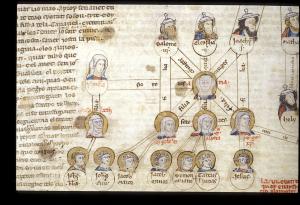
There is a duality to Christ, even as he is one. This duality does not remove or disturb that oneness but is founded upon and finds itself fulfilled by it. This duality is related to the two natures of Christ. Jesus is God and human. The divine person of the Logos assumed human nature and became one with the whole of humanity, and with humanity, with the rest of creation. This duality is also found in the way Christ comes to visit creation twice; first, Christ came to open up the pathways of grace to creation, and in the second, Christ will come again to judge the living and the dead.
To prepare for the incarnation the first coming of Christ, God worked with the world, guiding and directing it, planting seeds of the Logos throughout every nation and every culture. Nonetheless, God was especially close with the people of Israel. They were set apart from the rest of the world for the express purpose of the incarnation. In the history of Israel, we find many holy men and women, each having a place in the extended story of God’s work with humanity. Even before the Mosaic Covenant, we see this established with Abraham, Sarah, Isaac, and Rebekah. Then, we find it in the stories of Moses, Aaron, Miriam, David, Ruth, Deborah, and Esther. God continued to be at work with them in the prophets such as Isaiah, Ezekiel, and Daniel, and finally, we see the preparation for the incarnation comes to completion with those who came right before Jesus, and who lived during the time in which he lived, such Zechariah, Elizabeth, and John the Baptist. Reading about their lives, we can see how God’s grace was at work with humanity, preparing the world for the coming of the messiah. But it was not just with the people of Israel. Scripture points this out by the way it elevates many Gentiles, many outside of the Mosaic Covenant, as holy men and women of God, like we find with Job and Melchizedek. God was not exclusively at work with the people of Israel. God is a God over all people. God made sure that the messiah would indeed fulfill the spiritual expectations and needs of all. The time before Christ was not a time in which God abandoned humanity, but rather, it was the time in which God was working with humanity, preparing it for the coming of the messiah and all the blessings God would bring to us in and through the incarnation.
The stories of the ancestors of Christ, and the people of Israel, let alone the holy Gentiles ,are important for us, for they set the stage for Christ, for the first coming of Christ, and the work which he accomplished in the first century. But now, after the life, death, resurrection, and ascension of Christ, we live in a new age, one which prepares for when Christ will come again to judge the living and the dead. The judgment of Christ must not be understood as separate from his love and grace, but rather, its affirmation; the judgment is merciful as it is just, and its purpose is not to condemn but to save humanity. “For God sent the Son into the world, not to condemn the world, but that the world might be saved through him” (Jn. 3:17 RSV). What Jesus said is true, not just for his first coming into the world, but also for second coming; if we look at the second coming as the time which Jesus comes to judge as being without mercy, he would not be promoting justice; if we see the wrath of God is aimed at persons instead of sin, we do not understand that wrath, for we turn it into a nihilistic principle which counters God’s love for the world. This is not to say the last judgment, the final eschatological judgment, is something which we should take lightly: it is about our salvation, but as Jesus showed us on the cross, the path of salvation takes us through death and the darkness of hell so that we can be saved from both. Whatever sin we find ourselves attached to, whatever sin which we have yet to overcome, will have to be overcome, and in that judgment, we will experience the living flame of God’s love coming to us, purifying us from all sin; the light of truth will judge all such sin, condemning it, even as it works to free us from that sin so that we can be rid of it and find ourselves, in the end, free from all stain so we can receive God’s deifying grace.
“When Christ who is our life appears, then you also will appear with him in glory” (Col. 3:4 RSV). How can we, who will be judged with everyone else, appear in glory with Christ? The judgment is outside of time, and its fulfillment is also outside of time. We will appear to ourselves because we will see who and what we can be and are meant to be and will be when we are full of grace. Looking upon ourselves, we will see far we are from who and what we can, and indeed should, be. The judgment of Christ will have us look to ourselves and see the difference between what we have made ourselves to be on our own and what we can be and will be once we have fully integrated ourselves into Christ and entered into eternal glory. And he will do so because we will appear to ourselves, coming with Christ, from that eternal glory, showing what we can and will become once we have entirely turned ourselves over to God and have cast away all sin from ourselves. But to become that person, we truly have to be judged and accept the judgment for what it shows us; we will have to condemn our own sin, cast it aside, and accept the fullness of God’s grace into our lives; that way we will find ourselves transformed and become the person we see coming to us with Christ.
The judgment is yet to come. We know it is for our own good, because by it and through it, we will find ourselves purified from every remnant of sin so we can receive God’s glory in ourselves and be deified by it. And yet, we also know it is dreadful, because, insofar as such sin remains with us, we will encounter the fiery wrath of God, which will burn at us in the judgment until we are truly made pure. This is why it is best to prepare for the judgment before we come to it at the end of our life. We do not have to wait for the judgment. Right now, we can cooperate with grace, rise up against sin, and put it away; the more we do so now, the less there will be for God to judge. Which is why Paul says:
Put to death therefore what is earthly in you: fornication, impurity, passion, evil desire, and covetousness, which is idolatry. On account of these the wrath of God is coming. In these you once walked, when you lived in them.
But now put them all away: anger, wrath, malice, slander, and foul talk from your mouth. Do not lie to one another, seeing that you have put off the old nature with its practices and have put on the new nature, which is being renewed in knowledge after the image of its creator. Here there cannot be Greek and Jew (Col3: 5-11 RSV).
We are able to put on Christ, to take on grace, and find ourselves transcend ourselves, but only if we die to the self, to the sinful, fallen, egotistical, selfish, self, putting aside all evil desires, all inclinations which promote that fallen self and all its works.
Christ has come, and Christ will come again. The two events are one in Christ, for in Christ, there is no true division. This is why the judgment is to come at the end of the world but is also with us now. We are to Christ, called to receive the vast store of deifying grace; we are called, but if we do not come now, we will be compelled later to come, and then we shall experience the judgment with all its might (cf. Lk. 14:16-24).
Stay in touch! Like A Little Bit of Nothing on Facebook.
If you liked what you read, please consider sharing it with your friends and family!













